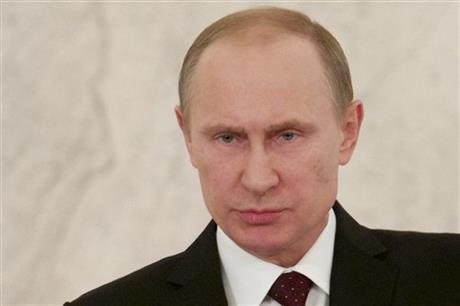
By NATALIYA VASILYEVA
Russian President Vladimir Putin delivers a state of the nation address in the Kremlin in Moscow, Thursday, Dec. 12, 2013. (AP Photo/Ivan Sekretarev)
MOSCOW (AP) — Russian President Vladimir Putin on Thursday announced a set of initiatives to crack down on Russian companies who register and pay taxes in offshore jurisdictions.
Russian companies both small and large have for years registered in countries like Cyprus or Luxembourg to avoid Moscow’s heavy-handed regulation and unpredictable legal and tax practices.
Putin said in a state of the nation address on Thursday that practice must end. Foreign-registered companies that operate in Russia and have Russian citizens as beneficiaries should be obliged to pay taxes in Russia.
“You want to have offshores? Fine. But get the money here,” he said.
Russian companies registered in offshore jurisdictions will not be allowed to bid at state tenders, Putin said. State tenders have been a major source of income for many Russian businesses.
Putin also threatened to stop propping up Russian companies with foreign registration. The Kremlin spent billions out of its rainy-day fund in 2008 to bail out industry giants including Rusal, the aluminum producer that is registered in Cyprus.
Leading businessmen have said they would be willing to drop foreign registration only after Russia launches tangible reforms of the court system and law enforcement.
Half of $50 billion that Russian companies invest abroad every year is sent to offshore jurisdictions, which Putin described as the “transfer of capitals that should be working in Russia.”
He singled out the biggest deal of the year, Rosneft’s takeover of oil company TNK-BP, as a prime example of avoiding the Russian jurisdiction. Although TNK-BP was headquartered in Moscow, its parent company was registered in the British Virgin Islands.
Rosneft’s chief executive, Igor Sechin, defended the company’s $55 billion offshore purchase, telling the RIA Novosti news agency on Thursday that it was not Rosneft’s choice to do the deal abroad. It’s often the other party that insists that deals be registered in foreign jurisdictions, Sechin said.



